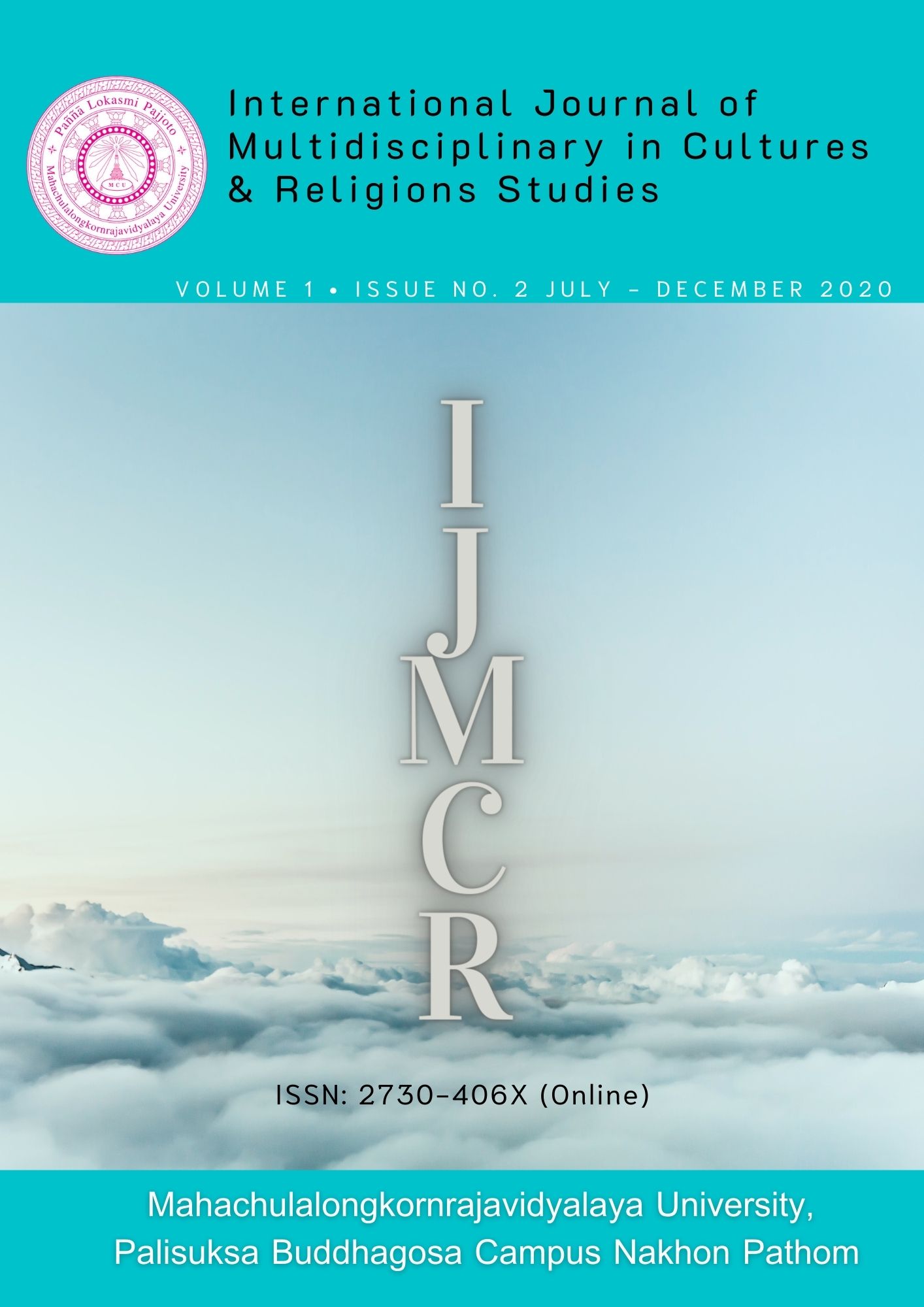Buddhism and Child Psychology Development
Main Article Content
Abstract
From the analysis study on “Buddhism and Child Development”, the writer has raised the question in the introduction section about child Psychology Development weather in a Buddhist and Western context there is conformity or difference in some dimension or not. This includes the meaning of life Development Task involve child growth care givers and management methods for child health caring. According to the analysis in all dimensions, the writer has found many interesting issues which are summarized here as the three core issues, considered as the heart of this study, as follow.
- The aim of developing base on as a Dhamma principle to context needs or Survival of Life. This emphasizes needed on newborn – 1 year a half. More importantly, it gives might to caring the body with milk sucking/breast feeding, sleeping, excreting, breathing; Instead, holistic caring encourages human being to realize a Basic Needs Principles meaning both physical and mental coherent cares. In Buddhism, we have been taught to recognize that, In Buddhism, this circuit is called the circus of human life or round of existences. Who was born to death then it was Born, Adult, Aging then Dead. It was physically in the body when the element a part of body is born, it is painful and death has never ended.
- Western Theory focus on the happiness responded, the significant other to be loved one, a society that promotes development by age, is an external stimulus. But Buddhism steps forward to the child development of other-worldly happiness (a supra mundane state of mind) As, the ultimate goal of child Development is person can discover a deep inner self of this individual as follow; lovely, greedy, angrily, passionate. The four interesting principles found in Buddhism is 4 aspect of nature law. However, the notice about this emphasis regarded by the Buddhism is that all. Although the psychological meanings, that is a broad word. The behavior of adaptation in which people interact with the environment. But Buddhism has focused on psychology. Its content and moral values are important. Buddhist Social Psychology, It is a role in social behavior and social reaction.
- Western personality theory focused on personality development on stability to prevent life without neurosis and psychosis disorder. But in the Buddhist with the knowledge way, such thoughts and practices as Sri Ruen Kaewkangwan (2007) suggested that the practice of mindfulness and concentration is practiced in daily life. This is the goal of Buddhist psychology. It is a direct mental training that emphasizes on studying, analyzing, and analyzing mental training.
Article Details
How to Cite
Kaewla, W. ., Prajak, P. P., & Sa-ard-iam, T. . (2021). Buddhism and Child Psychology Development. International Journal of Multidisciplinary in Cultures & Religions Studies, 1(2), 13–18. retrieved from https://so04.tci-thaijo.org/index.php/ijmcr/article/view/248385
Section
Articles
References
Bee, H. L. (1992). The developing child. London: Harper Collins.
Engler. B. (2006). Personality theories. (7th ed.). New Jersey: Houghton Miffin.
Erikson, E. H. (1963). Childhood and society. New York: Norton.
Erikson, E. H., Paul, I. H., Heider, F., & Gardner, R. W. (1959). Psychological issues (Vol.1). International Universities Press.
Gross, R. D. & Humphreys, P. (1992). Psychology: The science of mind and behavior. London: Hodder & Stoughton.
Havighurst’s development theory online Available 29 June 2018, https://www.slideshare.net/ ArshiyaJabeen2/havighursts-development-theory.
Havighurst’s Theory of Development task, http://edunewbox.blogspot.com/p/blog- page.html online available 29 June 2018.
Jacobson, N.P. (1970). Buddhism: The religion of analysis. Illinois: Southern Illinois University Press.
Kaewkangwan, S. (2007). Development of Buddhist Personality: Four Mindfulness and Concentration. Arts Journal, 7(2), 54-77.
Kohlberg, L. (1981). The Philosophy of Moral Development Moral Stages and the Idea of Justice. San Francisco: Harper & Row.
McAdams, D. P. (2001). The psychology of life stories. Review of General Psychology, 5(2), 100.
McCrae, R. R., & Costa Jr, P. T. (1997). Personality trait structure as a human universal. American Psychologist. 52(5), 509.
McLeod, S.A. (2013). Erik Erikson. Retrieved from www.simplypsychology.org/Erik- Erikson. html.
Psychoanalysis Theory Access 1 July 2018 online Available https://www.simplypsychology. org/psychoanalysis.html
Psychosexual developmental stage https://www.baanjomyut.com/library_2/extension-/concepts_of_developmental_psychology/01_3.html online available 1 July 2018.
The journey of life invites you to think of Piyasophon. Access 1 July 2018 online Available http://goodlifeupdate.com/healthy-mind/dhamma/3182.html(Transmigration).
U. Uhlendorff. (2004). The Concept of Developmental - Tasks. Social Work and Society, Volume 2, Issue 1, Access 29 June 2018 online Available http://www.socwork.de /Uhlendorff2004.pdf.
Engler. B. (2006). Personality theories. (7th ed.). New Jersey: Houghton Miffin.
Erikson, E. H. (1963). Childhood and society. New York: Norton.
Erikson, E. H., Paul, I. H., Heider, F., & Gardner, R. W. (1959). Psychological issues (Vol.1). International Universities Press.
Gross, R. D. & Humphreys, P. (1992). Psychology: The science of mind and behavior. London: Hodder & Stoughton.
Havighurst’s development theory online Available 29 June 2018, https://www.slideshare.net/ ArshiyaJabeen2/havighursts-development-theory.
Havighurst’s Theory of Development task, http://edunewbox.blogspot.com/p/blog- page.html online available 29 June 2018.
Jacobson, N.P. (1970). Buddhism: The religion of analysis. Illinois: Southern Illinois University Press.
Kaewkangwan, S. (2007). Development of Buddhist Personality: Four Mindfulness and Concentration. Arts Journal, 7(2), 54-77.
Kohlberg, L. (1981). The Philosophy of Moral Development Moral Stages and the Idea of Justice. San Francisco: Harper & Row.
McAdams, D. P. (2001). The psychology of life stories. Review of General Psychology, 5(2), 100.
McCrae, R. R., & Costa Jr, P. T. (1997). Personality trait structure as a human universal. American Psychologist. 52(5), 509.
McLeod, S.A. (2013). Erik Erikson. Retrieved from www.simplypsychology.org/Erik- Erikson. html.
Psychoanalysis Theory Access 1 July 2018 online Available https://www.simplypsychology. org/psychoanalysis.html
Psychosexual developmental stage https://www.baanjomyut.com/library_2/extension-/concepts_of_developmental_psychology/01_3.html online available 1 July 2018.
The journey of life invites you to think of Piyasophon. Access 1 July 2018 online Available http://goodlifeupdate.com/healthy-mind/dhamma/3182.html(Transmigration).
U. Uhlendorff. (2004). The Concept of Developmental - Tasks. Social Work and Society, Volume 2, Issue 1, Access 29 June 2018 online Available http://www.socwork.de /Uhlendorff2004.pdf.


